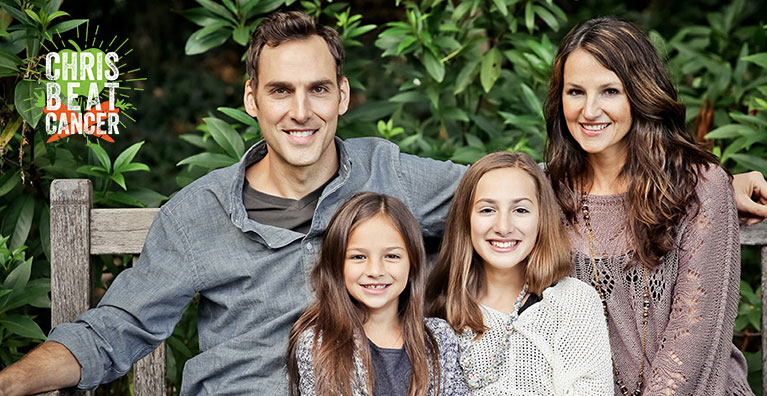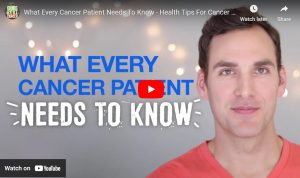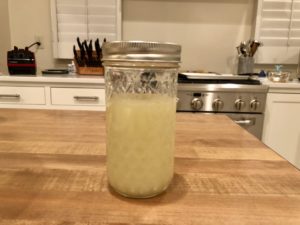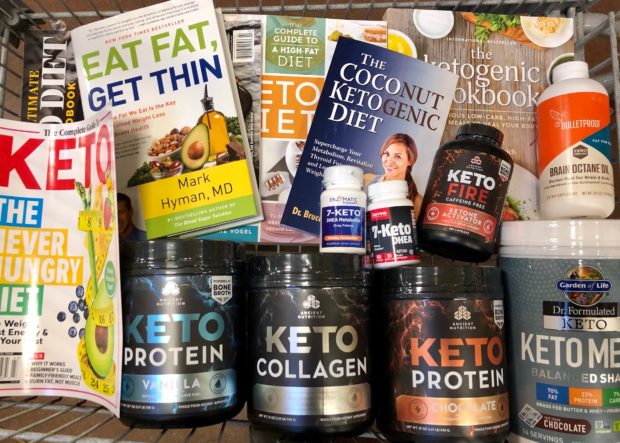
Updated November 29, 2019
The ketogenic diet was the most popular diet searched on Google in 2018 and has officially reached mega-fad status – as did the Atkins Diet, in its heyday.
If you don’t know what the ketogenic diet is, there are, by my estimation, 1.2 zillion articles about it online, so I’m not going to go into great detail explaining it here. But, basically, the ketogenic diet is a diet comprised of 70-80% fat, a “moderate” amount of protein, and near zero carbohydrates.
A true ketogenic diet keeps your body in ketosis 24/7, which can be verified by daily measurement of ketone levels in your urine. Ketosis is difficult to maintain and the term “ketogenic diet” is now widely misused by people who are eating a low-carb diet, without actually being in ketosis.
If you think you are eating a ketogenic diet and you aren’t monitoring your ketone levels, you probably aren’t in ketosis and eating a “ketogenic diet”.
I used to think the ketogenic diet might be a viable anti-cancer diet for some people, but I was wrong.
Before I dig into the research on the ketogenic diet for cancer, I need to say this… Obesity is the second leading cause of cancer. If you are overweight, getting back down to a healthy weight range with a normal BMI will improve your health, and reduce your risk factors for cancer and many other chronic diseases. I have never met a doctor or health expert who didn’t agree with that statement.
It is also understood that every weight loss method improves various aspects of your health, in the short term. Typical improvements related to weight loss are reductions in inflammation, hormone levels, blood pressure, cholesterol, and blood glucose, even reversal of type 2 diabetes, and more.
Repeat.
Every weight loss method improves your health in the short term.
You can lose weight quickly by smoking crack or crystal meth. Any health issues you have, which are related to being overweight, will likely resolve because you lost weight. Chronic crack smoking causes weight loss. But no one in their right mind would attribute the benefits of weight loss to crack smoking, because it’s unhealthy and causes long-term damage to your body… which brings us to the ketogenic diet.
There is no population of people on earth who eat a ketogenic diet and have exceptional health and long lifespans. Even the Inuits/Eskimos, who eat high-fat diets, are not in ketosis. And they have short lifespans to boot! This is not a population you want to emulate.
This 2018 study found that people who eat low-carb diets have shorter lifespans (four years shorter, on average), unless they eat low-carb vegan diets. Here’s a quote from the conclusion of that study…
“Low carbohydrate dietary patterns favouring animal-derived protein and fat sources, from sources such as lamb, beef, pork, and chicken, were associated with higher mortality, whereas those that favoured plant-derived protein and fat intake, from sources such as vegetables, nuts, peanut butter, and whole-grain breads, were associated with lower mortality…”
Another 2018 study reported that people who ate the lowest-carb diets had a 32% increased risk of death from ANY cause than those eating the highest amount of carbs.
The researchers also found that low-carb dieters had a 51% increased risk of dying from heart disease and a 35% increased risk of dying from cancer, compared to people who ate the most carbohydrates.
In 2016, the results of the NUSI metabolic ward study were published, where low carb diets were tested against low-fat diets for weight loss in humans. Gary Taubes and Dr. Peter Attia, the founders of NUSI, are both low-carb promoters, and this study was meant to prove that low-carb eating was superior for weight loss, but it actually found that low-fat diets worked better!
Perhaps the most egregious hypocrisy is that many health and wellness influencers currently making money promoting the ketogenic diet aren’t even following it. And the authors of several bestselling ketogenic diet books are obese! (I’m not going to name them here, because I’m nice.)
Ditching processed food and animal food and adopting a naturally low-fat, whole foods, plant-based diet with an abundance of delicious fruits, vegetables, legumes, nuts, seeds, and whole grains will do wonders for your health. It’s a sustainable, long-term health-promoting diet. And you will lose weight without even trying.
To sum it up, low-carb and ketogenic diets will result in weight loss, but not as much as low-fat diets. And they are terrible for you long term. And they increase your risk of an early death.
Having said all that, there is tremendous value in short-term ketosis induced by a 3-5 day water fast or the plant-based ProLon Fasting Mimicking Diet, which has numerous benefits in the body, including autophagy, as well as stem cell activation and immune system regeneration. You can learn more about that in my interview with world-renowned scientist and longevity expert Dr. Valter Longo here.
But what about the ketogenic diet for cancer?
The ketogenic diet has dominated the cancer conversation in recent years, thanks to the rapid dissemination of misinformation on the internet by opportunists, fad exploiters, book, program and supplement sellers, and a few sincere (but sincerely wrong) people.
So, let’s set the opinions of your favorite health gurus, chiropractors, and internet doctors aside for a moment and go straight to the science… (Please click through and read the studies!)
There are several studies in which researchers implanted human gliomas (brain cancer) into the bodies of rats (a completely unrealistic scenario for humans) and reported that the rats lived longer on a ketogenic diet. After these studies were published, the keto for cancer feeding frenzy began.
As you will see, the results of the rat studies appear promising, but the human studies… not so much.
A 2011 pilot study involving 16 human patients with advanced cancer concluded that the ketogenic diet “might improve aspects of quality of life and blood parameters,” but the patients did not live longer and none were cured.
In this 2012 study, rats with human brain cancer implanted in their bodies achieved complete remission when fed a keto meal replacement shake called KetoCal and treated with radiation. Rats treated with a ketogenic diet (KetoCal) but without radiation only lived 5 days longer than standard diet rats.
In this 2013 study, rats with human brain cancer implanted in their bodies lived 56% longer on a ketogenic diet, combined with hyperbaric oxygen therapy. “56% longer” sounds huge…until you learn that the average keto+oxygen therapy survival was 55 days compared to the control rats who lived 31 days. And all the rats still died of cancer.
This 2012 study showed that tumors can use ketones for fuel. Despite the widespread myth that “cancer cells can’t use fat for fuel,” they most certainly can and do. Many types of cancer cells are metabolically flexible. If you starve them of glucose, it can weaken or slow them down temporarily. But they will eventually adapt to using fatty acids or amino acids (like glutamine) for fuel by up-regulating various pathways like F.A.S. (Fatty Acid Synthesis), SREBP 1 and 2 (sterol regulating end binding proteins), mTOR, Glutaminolysis, and more.
This 2014 study found that a ketogenic diet helped anti-angiogenic chemo drug bevacizumab work a little better for glioblastoma in humans, but had no effect alone.
According to a 2015 review of the literature on the ketogenic diet for human glioma patients (32 case studies), “Prolonged remissions ranging from more than 5 years to 4 months were reported in the case reports. Only one of these patients was treated using the ketogenic diet as monotherapy. The best responses reported in the more recent patient series were stable disease for approximately 6 weeks.” Like I said, in some cases the keto diet might slow the cancer down for a bit. But then it adapts and keeps growing.
The ketogenic diet can speed up cancer growth
A 2017 study published in Cell found that a genetic mutation called BRAF V600E allows cancer cells to use ketones to grow faster. This mutation is present in 50% of melanomas, 10% of colon cancers, 100% of hairy cell leukemias, and 5% of multiple myelomas.
A 2018 study found that mice with acute lymphoblastic leukemia treated with vincristine that were put on a low-fat diet had a five times higher survival rate than those on a high-fat diet. The mice on a low-fat diet had a survival rate of 92 percent, while the mice on the high-fat diet had a 17 percent survival rate. There is now a pilot study underway using a low-fat diet alongside treatment for childhood leukemia.
This 2018 study found that the ketogenic diet, combined with PI3K-inhibiting drugs, slowed tumor growth in mice better than the drug alone. But the mice given the ketogenic diet alone had accelerated progression of acute myeloid leukemia. The keto diet made the cancer grow faster.
Another 2018 study found that fat fuels aggressive brain cancers. Slow-dividing glioblastoma cells, which are more invasive and resistant to chemo and radiotherapy than the fast dividing cells, use fat (not glucose) for energy.
A 2019 study found that a ketogenic diet suppressed the growth of squamous cell lung cancer in mice compared to control, but did not affect the growth of adenocarcinoma lung cancer. The ketogenic diet did not cure or reduce the disease. According to study authors, “There was no tumor regression by ketogenic diet alone.”
A 2019 study found that a ketogenic diet was “feasible and safe as an adjuvant to chemoradiation treatment” for humans with glioblastoma multiforme, a notably weak conclusion. In addition, the overall survival of the gliobastoma patients in that study was actually shorter than other similar studies on that protocol (12 months versus 15-20 months). Authors of a paper reviewing that study hypothesized that the patients didn’t live as long as comparable studies because for the first six weeks they were almost exclusively fed a highly artificial ketogenic diet in the form of a processed liquid “food” product called KETOCAL.
A 2019 study found that prostate cancer patients who had the highest levels of saturated fat in their diets were four times more likely to die from prostate cancer compared to patients with the lowest saturated fat intake.
A 2023 study in mice found that a high fat diet changes gut bacterial composition for the worse, increasing Ileibacterium valens and Ruminococcus gnavus, which results in increased inflammatory bile acids, downregulation of the farnesoid X receptor (FXR), which in turn negatively affects the proliferation of intestinal stem cells, all of which increase the risk of colorectal cancer.
The most important keto for cancer study so far….
In December 2018, a review of ALL published studies using the ketogenic diet for cancer in humans was published. It found that clinical trials using the ketogenic diet for cancer have “largely failed to prove survival prolonging effects.” But the author hypothesized that the ketogenic diet still might have “potential” if combined with chemotherapy. Ok…
The ketogenic diet has repeatedly been shown NOT to cure cancer as a monotherapy in rodents or humans.
It is my opinion that the best evidence-based anticancer diet – which I discuss at length on this site and in great detail in my book – is a mostly raw, organic, whole foods, plant-based diet centered around the foods with the highest concentration of anti-cancer compounds like cruciferous and allium family vegetables, berries, and more. Why? Because I know lots of holistic survivors, myself included, who have healed all types and stages of cancer with that exact dietary strategy. I’ve interviewed 60+ of them here.
We can learn from the experience of others.
If you want to be successful, imitate successful people. And if you’re serious about healing and preventing cancer, I want to encourage you to incorporate the dietary and healing strategies used by the overwhelming majority of people who have healed themselves of cancer. That’s why this site exists. Dig in.
…
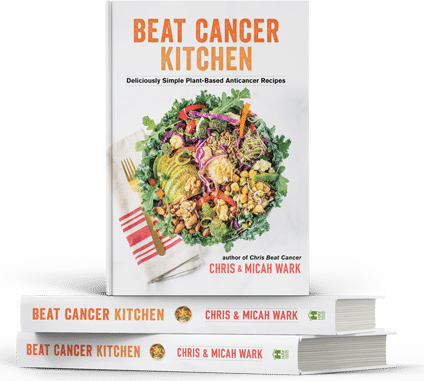
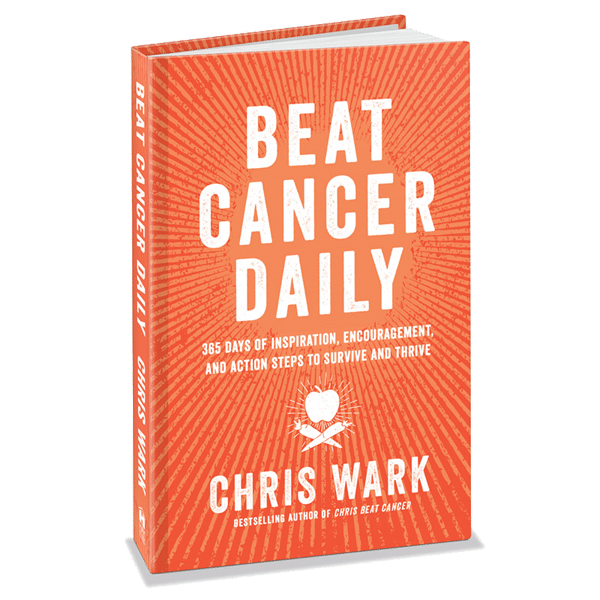
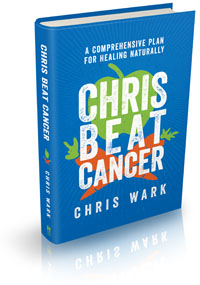 Chris Beat Cancer: A Comprehensive Plan for Healing Naturally, published by Hay House, is a National Bestseller as ranked by USA Today, The Wall Street Journal, and Publishers Weekly! Get it on Amazon here, or anywhere books are sold.
Chris Beat Cancer: A Comprehensive Plan for Healing Naturally, published by Hay House, is a National Bestseller as ranked by USA Today, The Wall Street Journal, and Publishers Weekly! Get it on Amazon here, or anywhere books are sold. I've interviewed over 60 people who've healed all types and stages of cancer. Check them out here. Or use the search bar to find survivors of specific cancer types.
I also created a coaching program for cancer patients, caregivers and anyone who is serious about prevention called SQUARE ONE. It contains the step-by-step strategies used by myself and everyone I know who has healed cancer with nutrition and natural, non-toxic therapies.
Watch SQUARE ONE Module 1 for free here
(((c)))
Chris Beat Cancer is reader-supported. If you purchase a product through a link on this site I may receive compensation from the affiliate partner (like Amazon). Your support helps fund this blog and my mission so my team and I can continue to do the work that we do. Thank you!

